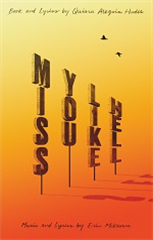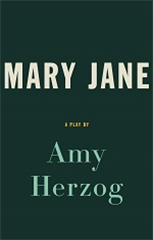Book reviews by Kitty Drexel
(New York, NY/Somerville, MA) On occasion, the New England Theatre Geek will review newly published plays. Miss You Like Hell is a musical about an mother/daughter road trip. Mary Jane is a loving insight into compassionate primary caregivers. Uncle Vanya is a piece of classic dramatic literature that places the significance of the #metoo movement within an historical context.
Miss You Like Hell
Book and lyrics by Quiara Alegria Hudes
Music and lyrics by Erin McKeown
TCG
New York 2018
$14.95 Paperback
For a musical about a disillusioned teenager and her undocumented mamma taking an impromptu road trip across the States, Miss You Like Hell (MYLH) is remarkably upbeat. All of the characters are unusually hopeful in their mission (except for sixteen year old Olivia… because she’s sixteen after all) to get to LA in time for Beatriz’s immigration hearing. They aren’t running from ICE; they are running towards each other. It’s a beautiful story about a side of America that audiences rarely get to see anymore.
From the TCG website: “A troubled teenager and her estranged mother—an undocumented Mexican immigrant on the verge of deportation—embark on a road trip and strive to mend their frayed relationship along the way. Combined with the musical talent of Erin McKeown, Hudes artfully crafts a story of the barriers and the bonds of family, while also addressing the complexities of immigration in today’s America.”
Hudes and McKeown make a good writing pair. They are matched in unexpected ways. For example, they both like to experiment with form and function. Musical numbers such as “Mothers,” “Tamales” and “Bibliography” flip the switch on list songs. These lists teach us more about a character’s road back from dysfunction than they do their likes or dislikes. “Bibliography” particularly informs us of Olivia’s self-taught coping skills – or lack thereof. She details the books she read instead of needing her Mom. Books like Lolita and Their Eyes Were Watching God. Olivia grew up faster than a girl should.
Further, McKeown embraces the Mexican ancestry woven into Hudes’ script. McKeown offers a rock edge with a folk core that truly shines in Beatriz’s solo numbers. We’re given realistic and compassionate perspective into Beatriz’s personal beliefs; the beliefs that she is attempting to bestow upon Olivia. Unfortunately, that blend doesn’t reach through every number. “Yellowstone,” a song for the character Pearl, sticks out like a sore thumb. Its R&B groove is incongruent with the rest of the musical.
The book includes a characters list, song list, production history, acknowledgements, and creator biographies. MYLH is notable for its imparticular use of white casting. One could cast the entire musical with people of color. The characters of Mo and Higgens are described as retired (gay) Southerners. All sorts of gay people live in the South. The ensemble includes such characters as a lawyer, and a legal clerk. They don’t have to be white.
Quiara Alegría Hudes’s plays and musicals include Water by the Spoonful, winner of the Pulitzer Prize for Drama; In the Heights, winner of the Tony Award for Best Musical and a Pulitzer Prize finalist; and Elliot, A Soldier’s Fugue, also a Pulitzer Prize finalist. They have been performed on and Off-Broadway and around the world.
Erin McKeown is a musician, writer and producer known internationally for her prolific disregard of stylistic boundaries. She has released ten full-length albums and several EPs over the last twenty years, all the while refining her distinctive and challenging mix of American musical forms. Miss You Like Hell is her first theatrical composition.
Mary Jane
By Amy Herzog
TCG
New York 2018
$14.95 Paperback
Reading Mary Jane could make you a better person if you let it. Herzog’s script radiates onto the reader compassionate energy and enthusiastic unconditional love. It’s an exquisite story that captures the extreme joys and sadness, the laughter through tears that is loving a severely disabled individual. Mary Jane is a gift that deserves many productions and avid appreciation. Please read it.
Mary Jane captures the disabled experience from the perspective of a caregiver. It should not be compared to another 2018 TCG publication, Cost of Living by Martyna Majok. They are similar in that they both approach the disabled experience through drama but that is where the similarity ends. Cost of Living violently disrupts the perceived understanding of disability as inspirational or infantile with bitter truths. Mary Jane ambushes the heart through odd-defying optimism. This holiday season, it could melt the coldest of hearts.
From the TCG website: Armed with medicines, feeding tubes, and various medical equipment, Mary Jane is a single mother and indefatigable force when it comes to caring for her young, sick child. A moving play about the stalwart endurance of a devoted mother, Mary Jane demonstrates the prevailing strength of the human will when fueled by unconditional love.
I’m not going to pretend that this critique is impartial: I am a disabled woman; this play hit me hard and my reaction was emotional. I could not possibly understand what my own mother, my primary caregiver, went through in order to assure that I received equal, effective treatment at hospitals, schools, and other institutions as I grew from a baby with an undiagnosed disability into the woman I am today. Mary Jane gives me the slightest of inklings, and I am grateful.
Amy Herzog’s plays include 4000 Miles (Pulitzer Prize finalist), After the Revolution, Belleville, and The Great God Pan. Herzog is the recipient of numerous awards, including the Whiting Writers’ Award, an Obie Award, and the Helen Merrill Award for Aspiring Playwrights. Mary Jane received an Obie Award for Playwriting and a New York Drama Critics’ Circle Award for Best Play. Herzog received an MFA from the Yale School of Drama.
Uncle Vanya
By Anton Chekhov
Translated from the Russian by Richard Nelson, Richard Pevear, and Larissa Volokhonsky
TCG
New York 2018
$15.95
This is a recent translation of Uncle Vanya: Scenes from Country Life in Four Acts. It is not modernized. This translation is not to be confused with Annie Baker’s Uncle Vanya which TCG published in 2014.
Pevear provides an introduction to this translation that gives historical context to Chekhov’s play. Young readers or those unfamiliar with Chekhov’s work will find the passage useful as it examines Uncle Vanya from its nascent stages as The Wood Demon: A Comedy in Four Acts. Pevear briefly approaches reasoning for the play’s title but for a more certain thesis on these and other nuances, the reader must do further research.
This play could be renamed Elena Andreevna: Men Mansplaining Men’s Attraction to Women in Four Acts without changing a word. (I’ve always thought this way. This lovely translation wasn’t the straw to break the camel’s back). It’s casual approach to domestic assault and gaslighting would be commonplace to Chekhov’s audiences but are exceptional to today’s. The female characters receive the blame as if it were a gift. It makes Uncle Vanya difficult to read.
The character Ivan Petrovich Voinitskaya, aka Uncle Vanya, isn’t the main character. Rather, it is the beautiful Elena who holds the attention of every important male character in the play; she carries the majority of scenes; it is she who acts as dramatic catalyst for change. Uncle Vanya is the man holding the gun in Act Three.
As the sixth play in the TCG Classic Russian Drama Series, Richard Nelson and preeminent translators of Russian literature, Richard Pevear and Larissa Volokhonsky, continue their collaboration with Chekhov’s most intimate play.
Richard Nelson’s many plays include Illyria; The Gabriels: Election Year in the Life of One Family (Hungry, What Did You Expect?, Women of a Certain Age); The Apple Family: Scenes from Life in the Country (That Hopey Changey Thing, Sweet and Sad, Sorry, Regular Singing); Nikolai and the Others; Goodnight Children Everywhere (Olivier Award for Best Play);Franny’s Way; Some Americans Abroad; Frank’s Home; Two Shakespearean Actors; and James Joyce’s The Dead (with Shaun Davey; Tony Award for Best Book of a Musical).
Richard Pevear and Larissa Volokhonsky have translated the works of Leo Tolstoy, Fyodor Dostoevsky, Nikolai Gogol, Anton Chekhov, Boris Pasternak, and Mikhail Bulgakov. Their translations of The Brothers Karamazov and Anna Karenina won the PEN Translation Prize in 1991 and 2002, respectively. Pevear, a native of Boston, and Volokhonsky, of St. Petersburg, are married and live in France.



